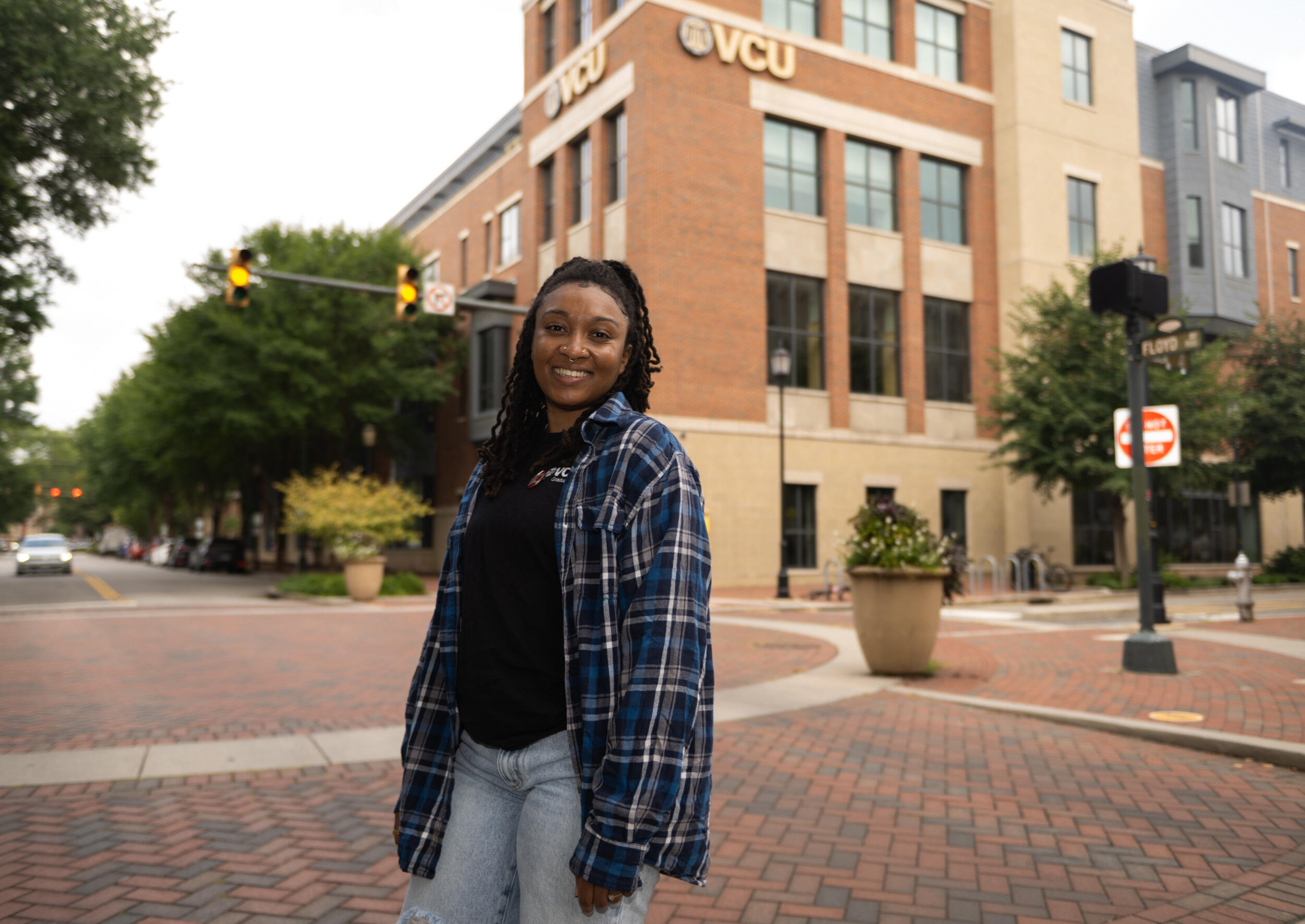Fellowship allows social work student to combine practice and policy
By Geoff LoCicero
VCU School of Social Work
Determination runs in Rayelle Ross’ family, she says, and it has manifested itself in her drive as a college athlete, in her passion for understanding her social work clients’ needs and in her pursuit of more knowledge and skills to help them.
The next building block for Ross, a second-year Ph.D. student in the Virginia Commonwealth University School of Social Work, is a Council on Social Work Education Doctoral Student Policy Fellowship that runs through December 2026.
The focus of Ross’ research – and the fellowship – is policy related to social safety net programs to alleviate intergenerational poverty in Black families, including the requirements and administration of programs such as Temporary Assistance for Needy Families and the Supplemental Nutrition Assistance Program.
As a fellow, Ross will have the opportunity for experiential learning through a placement with Lewis-Burke Associates, a government relations consultant that works with CSWE. The program also connects fellows to policymakers based on their research interests.
As much as the students gain experience, a key goal of the fellowship is helping legislators understand how social work can help shape federal policy.
“I need to get into the policy world and form those relationships and really understand why some of the legislators make the decisions that they make,” Ross said. “Sometimes I think people can be so out of touch with the realities of other people, they don't necessarily see the direct impact that it has on people. And so if I can do anything to be able to inform legislators about how these policies are impacting people, that would be great.”
Ross admits that working in the federal sphere can be challenging, but her attitude is to remain flexible, work with what she can control and stay true to her community. She attributes her resilience and tenacity to her family, including her father, Ray Ross, who grew up one of 16 children in the Jim Crow era in North Carolina.
Ross is a licensed clinical social worker, and she began to see the need for a deeper dive into macro social work – such as systemic policies and programming – while interning as a school social worker in Ohio. One student provided an “aha” moment.
“This particular kid would do great in my office. Interventions worked great,” she said. “That's because the environment that I created within my office was quiet, it was safe. Once he went out into the chaotic school environment, once he went out into his home life, it was super chaotic. So this works in my office, but if the (external) environment doesn't change, how do we expect his behaviors to change as well? I realized this is a systemic level thing that I would love to address. And so now I figure policy is the way to go.”
Similarly, she decided to pursue her Ph.D. after frustrations working as a military and family life counselor.
“It’s totally different working with military families when it comes to mental health,” Ross said. “I had to learn to maneuver within that system, but then I wanted to change it. And so if I want to change systems, I need to understand systems. If I want to make a bigger difference, maybe I should get my Ph.D.”

Ross emphasizes understanding implementation science – how and why systemic processes are set in motion and their impacts – as a means to system change. Ross, a former basketball player at Trinity International University in Illinois, turned to a basketball analogy for further explanation.
“There are specific things a coach needs to do in order to be able to implement a play,” she said. “You have to hold practices. There’s a method to having practices. You need to have good rapport with your players so they’re listening to you. You have to be clear with your instructions.”
Sports are an apt metaphor for Ross. Also a track athlete in junior college, she now views her career arc with a longer lens – think a marathon instead of a sprint. Ross worked as an employment training specialist for adults with developmental disabilities and as a clinical therapist before her transition into social work.
“I wanted to be out in the community,” Ross said. “And social work gave me the opportunity to do all different kinds of things. Social work really allows me to embody aspects of community that I saw growing up and especially in church.
“I don’t necessarily have a specific dream job, but I have dream conditions. Combining practice and policy, and being very connected with community, with the people within the policy so that I can really help funnel those voices into policy.”
Subscribe to VCU News
Subscribe to VCU News at newsletter.vcu.edu and receive a selection of stories, videos, photos, news clips and event listings in your inbox.
Latest Research & discovery
- American Counseling Association honors VCU’s Daniel GutierrezThe School of Education professor receives the professional group’s prestigious Fellows Award.
- VCU’s race car team returns to the fast laneWith a new student crew and an electric dream, Ram Racing revs up for the national Formula SAE competition in spring 2026.
- Are women better lawmakers than men? A nuanced yes, VCU researcher findsHowever, women serving on less professional state legislatures struggle to overcome lower-ranked committee assignments and entrenched sexism.
- VCU Research in Action: Through the algae in Richmond’s lakesResearchers wade into the fluorescent blooms of summer, which threaten human health and the region’s waterways.
- In stalking the ‘silent killer,’ he transforms health in the liver and beyondVCU transplant hepatologist Arun Sanyal targets liver disease and its wide-ranging implications.
- Richmond’s youth violence risk overlaps with historic redlining, new VCU research findsIn addition to lingering effects of discrimination, study finds that most victims treated at VCU’s trauma center were female.






